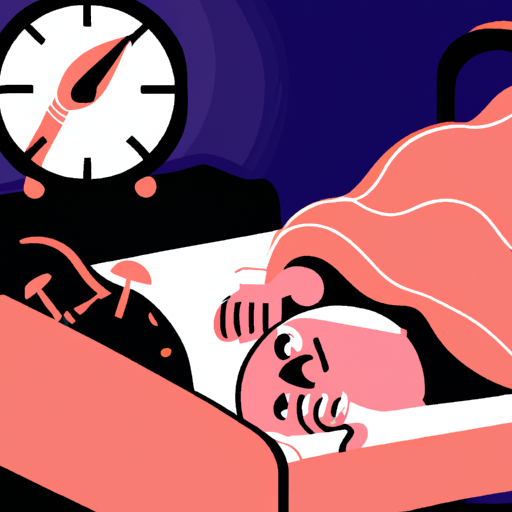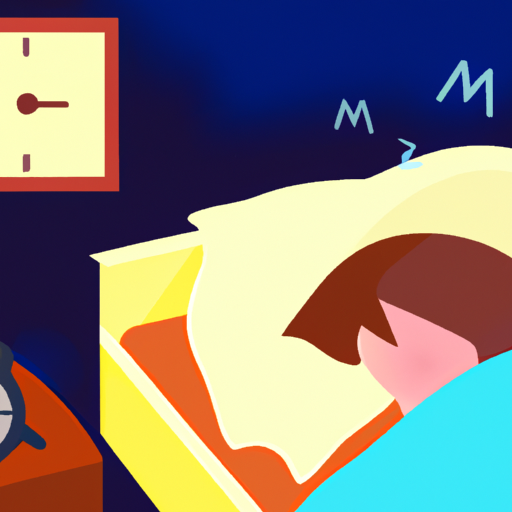Are you finding it hard to clock in those crucial eight hours of sleep every night? If so, you might be dealing with insomnia. Now, you might think insomnia is just about feeling groggy the next day, but did you know it can have a much more profound impact on your overall health? Stick around, as we delve into how insomnia can affect your overall health and potentially lead to other conditions.
So, what is insomnia? In essence, it’s a common sleep disorder that can make it hard for you to fall asleep, stay asleep, or cause you to wake up too early. Consequently, you might not feel refreshed when you wake up. It’s not just about the short-term effects like fatigue and mood swings; enduring insomnia can have more serious implications on your health.
The long-term impact of persistent insomnia can be far-reaching. It can affect your body in ways you might not have even imagined. For instance, it’s been linked to an increased risk of conditions like heart disease, diabetes and chronic pain. More so, it can mess with your immune system, making you more susceptible to infections. The mental health implications aren’t any less concerning – insomnia can contribute to anxiety and depression, as well as exacerbate pre-existing mental health conditions.
The good news is, identifying insomnia early and getting appropriate help can prevent these complications. If you’re struggling with sleep, don’t sweep it under the rug. Reach out to professionals who can provide guidance and treatment. Without a doubt, taking care of this aspect of your health can prove beneficial in the long run!
How Does Insomnia Affect Overall Health? Can It Lead to Other Conditions?
Understanding Insomnia
Defining Insomnia
Insomnia is a common sleep disorder that can make it hard for you to fall asleep, stay asleep, or cause you to wake up too early and not be able to get back to sleep. You may still feel tired when you wake up. Insomnia can sap not only your energy level and mood but also your health, work performance and quality of life.
Causes of Insomnia
Insomnia can be caused by a wide range of factors including stress, anxiety, depression, certain medications, caffeine, environmental factors such as noise or uncomfortable temperatures, and physical conditions such as chronic pain or restless leg syndrome.
Recognizing Signs and Symptoms
The symptoms of insomnia can include difficulty falling asleep, frequent awakenings during the night, waking up too early and not feeling refreshed after sleeping.
Impacts of Insomnia on Physical Health
Decreased Immune System Functionality
Chronic insomnia can interfere with immune function, making you more susceptible to illnesses.
Increased Risk for Certain Medical Conditions
From hypertension to diabetes and heart disease, chronic insomnia is associated with an increase in risk for a number of health conditions.
Long-term Physical Effects of Sleep Deprivation
Long-term effects of chronic insomnia can include fatigue, mood swings, memory problems, difficulties with concentration, and increased risk of mistakes or accidents.

Psychological Effects of Insomnia
Development of Mood Disorders
Insomnia is closely linked to the development of mood disorders such as depression and anxiety.
Effects on Cognitive Function
Chronic insomnia can affect cognitive functions such as memory, attention, and decision-making abilities.
Link Between Insomnia and Anxiety
Research has shown a strong link between anxiety and insomnia, with each condition having the potential to exacerbate the other.
Social Impacts of Insomnia
Insomnia’s Impact on Relationships
Mood swings and irritability due to lack of sleep can strain relationships and can interfere with your ability to nurture meaningful connections.
Effect on Work or School Performance
Insomnia can lead to problems with concentration, memory, and attention, which can negatively impact your performance at work or school.
Social Isolation Due to Chronic Fatigue
Chronic fatigue due to insomnia can make it harder to engage in social activities, leading to feelings of isolation and loneliness.

Significant Health Conditions Linked to Insomnia
Heart Disease
Chronic insomnia has been linked to an increased risk of developing heart disease.
Obesity
There is evidence that chronic sleep deprivation can alter the way the body metabolizes food, leading to increased risk of obesity.
Diabetes
Studies have linked chronic insomnia to an elevated risk of developing type 2 diabetes.
Interrelationship Between Insomnia and Mental Disorders
Impact of Insomnia on Existing Mental Health Issues
Insomnia can exacerbate existing mental health problems, such as depression and anxiety, further complicating their management.
Role of Insomnia in Development of Mental Health Issues
Insomnia can play a role in the development of mental health disorders, with some studies suggesting that sleep disruptions may trigger the onset of conditions like depression and anxiety.
Managing Co-existing Insomnia and Mental Health Conditions
Treatment of insomnia can often lead to improvements in co-existing mental health conditions, and vice versa.

Preventing Insomnia
Effective Bedtime Routines
Having a regular sleep schedule, relaxing before bed and creating a conducive sleep environment can help prevent insomnia.
Value of Healthy Diet and Regular Exercise
Regular physical activity can help reduce insomnia by promoting deeper sleep. Avoiding heavy meals close to bedtime can also help.
Reducing Stress and Promoting Mental Well-being
Techniques such as meditation, mindfulness and deep breathing can help manage stress levels, a significant factor in insomnia.
Treatment Options for Insomnia
Cognitive Behavioral Therapy for Insomnia (CBTi)
CBTi is an effective and recommended treatment for chronic insomnia. It involves working with a therapist to change sleep habits and address misconceptions about sleep and insomnia.
Pharmacological Treatments
Prescription medications can help with insomnia. However, some can cause side effects and should be used under a doctor’s supervision.
Alternative Therapies
Some people find relief from insomnia through alternative therapies such as yoga, acupuncture, and herbal supplements.

When to Seek Medical Help for Insomnia
Identifying When Insomnia is Serious
If insomnia is causing distress or affecting your quality of life, it’s time to seek medical help.
Understanding the Role of a Sleep Specialist
A sleep specialist can diagnose and treat sleep disorders like insomnia, often with more specialized knowledge and resources than a general practitioner.
What to Expect in a Sleep Study
During a sleep study, your brain waves, breathing, heart rate, and body movements are monitored while you sleep to diagnose sleep disorders.
Conclusion: Insomnia’s Impact on Health and Quality of Life
The Necessity of Addressing Sleep Issues Early
If left untreated, chronic insomnia can have serious effects on your physical and mental health. It’s important to seek help as soon as symptoms begin.
Proactive Steps for Managing Insomnia
By addressing potential triggers like stress or poor sleep habits, you can often manage or prevent insomnia. It’s also important to reach out to medical professionals for support and treatment when needed.
Encouragement for Sufferers to Seek Help
Don’t suffer in silence – if you’re struggling with insomnia, know that help is available and that you don’t have to face this alone.

